The Application of Benner's Theory to Nursing Education and Practice
VerifiedAdded on 2021/11/16
|9
|2481
|99
Essay
AI Summary
This essay provides a detailed overview of Patricia Benner's Theory of Nursing, which outlines the stages of skill acquisition and expertise development in nursing professionals. The theory progresses through five stages: Novice, Beginner, Competence, Proficiency, and Expert, each characterized by distinct levels of experience, knowledge, and clinical judgment. The assignment discusses how the theory contributes to the nursing field and the importance of experience and education in shaping a nurse's abilities. The essay also explores the application of the theory in nursing education, simulation activities, and the development of intuition among nurses. The provided references support how Benner's theory can be used as a framework for mentors, educators, and organizations to enhance the learning environment and allocate resources effectively, ultimately leading to better patient care and professional growth.
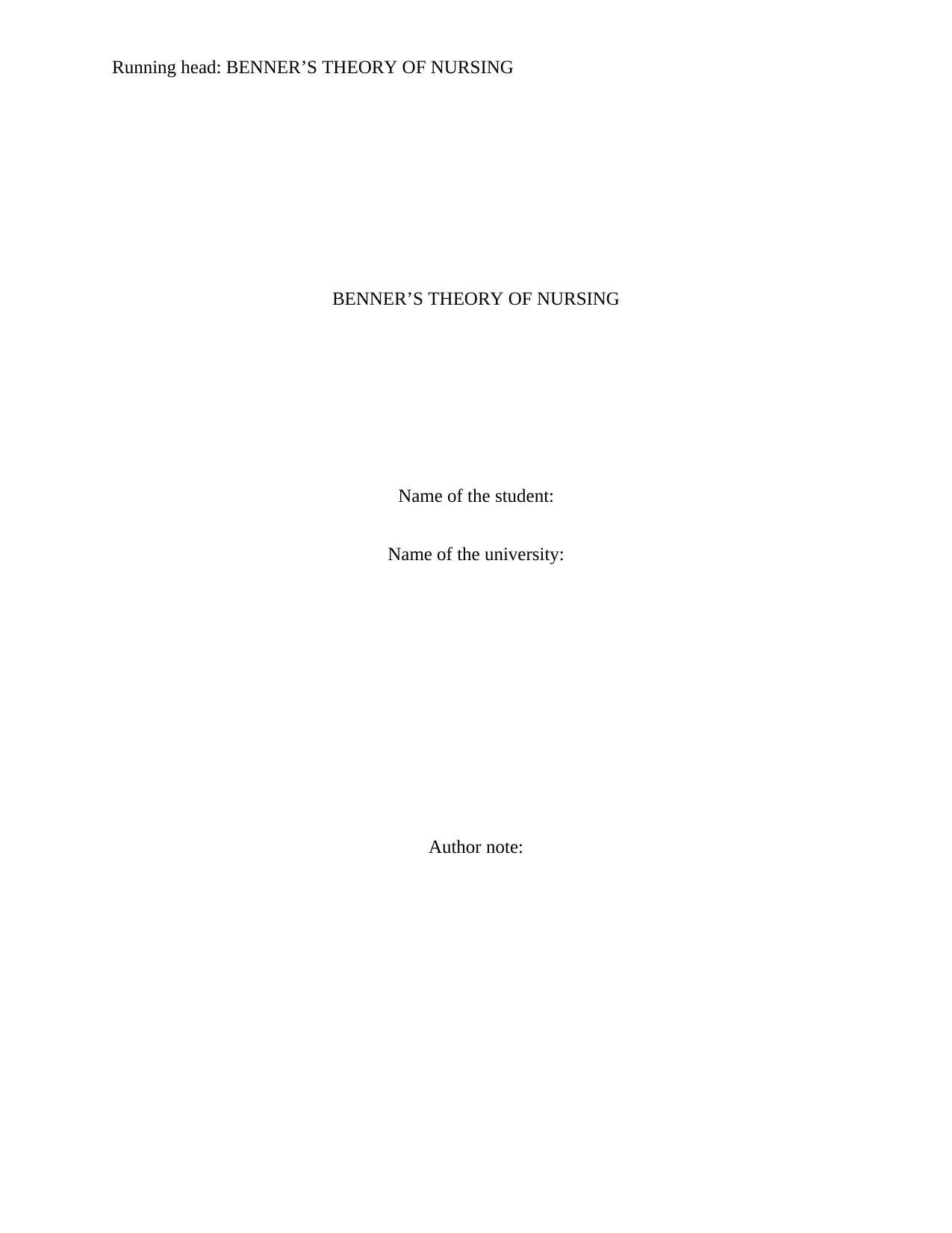
Running head: BENNER’S THEORY OF NURSING
BENNER’S THEORY OF NURSING
Name of the student:
Name of the university:
Author note:
BENNER’S THEORY OF NURSING
Name of the student:
Name of the university:
Author note:
Paraphrase This Document
Need a fresh take? Get an instant paraphrase of this document with our AI Paraphraser
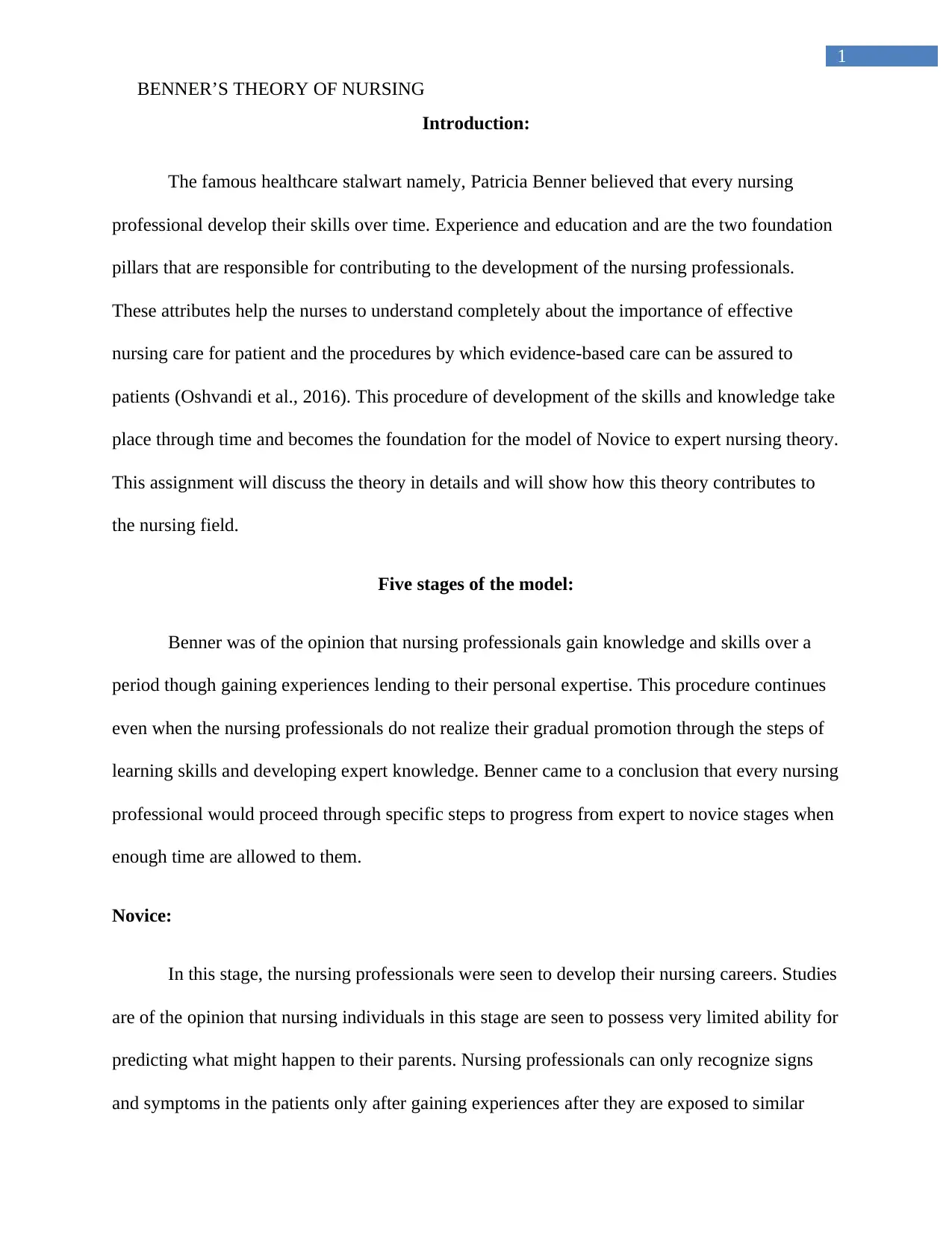
1
BENNER’S THEORY OF NURSING
Introduction:
The famous healthcare stalwart namely, Patricia Benner believed that every nursing
professional develop their skills over time. Experience and education and are the two foundation
pillars that are responsible for contributing to the development of the nursing professionals.
These attributes help the nurses to understand completely about the importance of effective
nursing care for patient and the procedures by which evidence-based care can be assured to
patients (Oshvandi et al., 2016). This procedure of development of the skills and knowledge take
place through time and becomes the foundation for the model of Novice to expert nursing theory.
This assignment will discuss the theory in details and will show how this theory contributes to
the nursing field.
Five stages of the model:
Benner was of the opinion that nursing professionals gain knowledge and skills over a
period though gaining experiences lending to their personal expertise. This procedure continues
even when the nursing professionals do not realize their gradual promotion through the steps of
learning skills and developing expert knowledge. Benner came to a conclusion that every nursing
professional would proceed through specific steps to progress from expert to novice stages when
enough time are allowed to them.
Novice:
In this stage, the nursing professionals were seen to develop their nursing careers. Studies
are of the opinion that nursing individuals in this stage are seen to possess very limited ability for
predicting what might happen to their parents. Nursing professionals can only recognize signs
and symptoms in the patients only after gaining experiences after they are exposed to similar
BENNER’S THEORY OF NURSING
Introduction:
The famous healthcare stalwart namely, Patricia Benner believed that every nursing
professional develop their skills over time. Experience and education and are the two foundation
pillars that are responsible for contributing to the development of the nursing professionals.
These attributes help the nurses to understand completely about the importance of effective
nursing care for patient and the procedures by which evidence-based care can be assured to
patients (Oshvandi et al., 2016). This procedure of development of the skills and knowledge take
place through time and becomes the foundation for the model of Novice to expert nursing theory.
This assignment will discuss the theory in details and will show how this theory contributes to
the nursing field.
Five stages of the model:
Benner was of the opinion that nursing professionals gain knowledge and skills over a
period though gaining experiences lending to their personal expertise. This procedure continues
even when the nursing professionals do not realize their gradual promotion through the steps of
learning skills and developing expert knowledge. Benner came to a conclusion that every nursing
professional would proceed through specific steps to progress from expert to novice stages when
enough time are allowed to them.
Novice:
In this stage, the nursing professionals were seen to develop their nursing careers. Studies
are of the opinion that nursing individuals in this stage are seen to possess very limited ability for
predicting what might happen to their parents. Nursing professionals can only recognize signs
and symptoms in the patients only after gaining experiences after they are exposed to similar
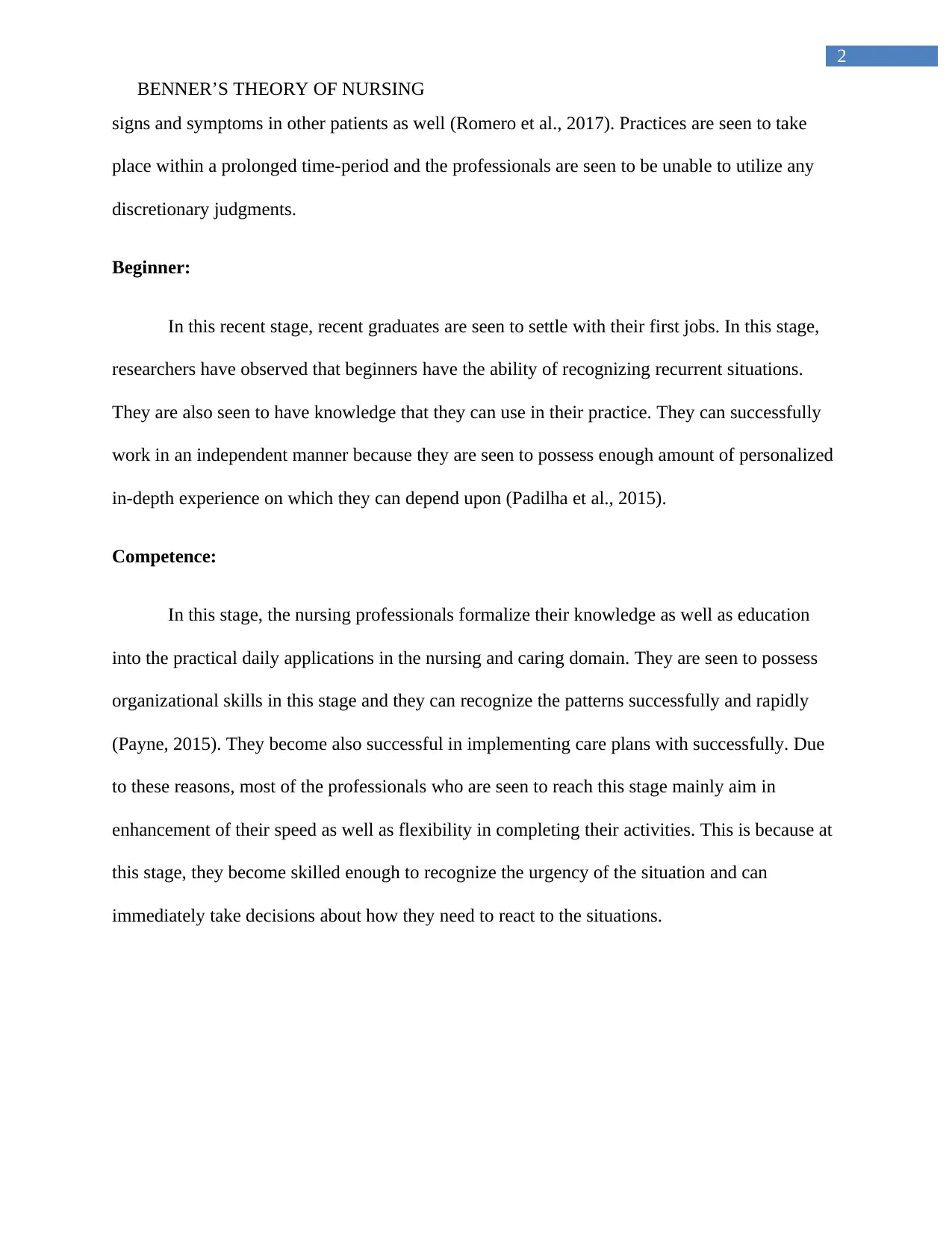
2
BENNER’S THEORY OF NURSING
signs and symptoms in other patients as well (Romero et al., 2017). Practices are seen to take
place within a prolonged time-period and the professionals are seen to be unable to utilize any
discretionary judgments.
Beginner:
In this recent stage, recent graduates are seen to settle with their first jobs. In this stage,
researchers have observed that beginners have the ability of recognizing recurrent situations.
They are also seen to have knowledge that they can use in their practice. They can successfully
work in an independent manner because they are seen to possess enough amount of personalized
in-depth experience on which they can depend upon (Padilha et al., 2015).
Competence:
In this stage, the nursing professionals formalize their knowledge as well as education
into the practical daily applications in the nursing and caring domain. They are seen to possess
organizational skills in this stage and they can recognize the patterns successfully and rapidly
(Payne, 2015). They become also successful in implementing care plans with successfully. Due
to these reasons, most of the professionals who are seen to reach this stage mainly aim in
enhancement of their speed as well as flexibility in completing their activities. This is because at
this stage, they become skilled enough to recognize the urgency of the situation and can
immediately take decisions about how they need to react to the situations.
BENNER’S THEORY OF NURSING
signs and symptoms in other patients as well (Romero et al., 2017). Practices are seen to take
place within a prolonged time-period and the professionals are seen to be unable to utilize any
discretionary judgments.
Beginner:
In this recent stage, recent graduates are seen to settle with their first jobs. In this stage,
researchers have observed that beginners have the ability of recognizing recurrent situations.
They are also seen to have knowledge that they can use in their practice. They can successfully
work in an independent manner because they are seen to possess enough amount of personalized
in-depth experience on which they can depend upon (Padilha et al., 2015).
Competence:
In this stage, the nursing professionals formalize their knowledge as well as education
into the practical daily applications in the nursing and caring domain. They are seen to possess
organizational skills in this stage and they can recognize the patterns successfully and rapidly
(Payne, 2015). They become also successful in implementing care plans with successfully. Due
to these reasons, most of the professionals who are seen to reach this stage mainly aim in
enhancement of their speed as well as flexibility in completing their activities. This is because at
this stage, they become skilled enough to recognize the urgency of the situation and can
immediately take decisions about how they need to react to the situations.
⊘ This is a preview!⊘
Do you want full access?
Subscribe today to unlock all pages.

Trusted by 1+ million students worldwide
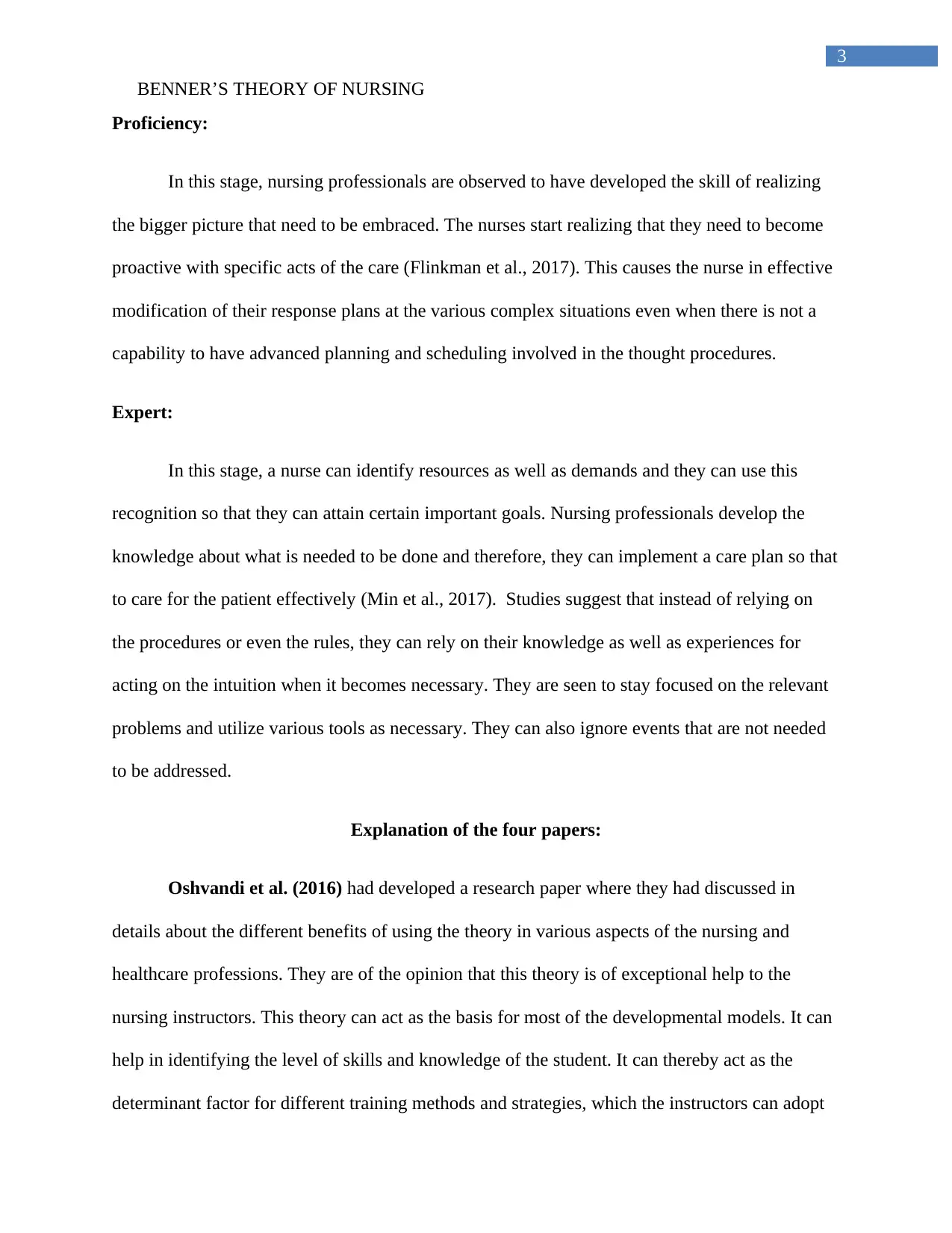
3
BENNER’S THEORY OF NURSING
Proficiency:
In this stage, nursing professionals are observed to have developed the skill of realizing
the bigger picture that need to be embraced. The nurses start realizing that they need to become
proactive with specific acts of the care (Flinkman et al., 2017). This causes the nurse in effective
modification of their response plans at the various complex situations even when there is not a
capability to have advanced planning and scheduling involved in the thought procedures.
Expert:
In this stage, a nurse can identify resources as well as demands and they can use this
recognition so that they can attain certain important goals. Nursing professionals develop the
knowledge about what is needed to be done and therefore, they can implement a care plan so that
to care for the patient effectively (Min et al., 2017). Studies suggest that instead of relying on
the procedures or even the rules, they can rely on their knowledge as well as experiences for
acting on the intuition when it becomes necessary. They are seen to stay focused on the relevant
problems and utilize various tools as necessary. They can also ignore events that are not needed
to be addressed.
Explanation of the four papers:
Oshvandi et al. (2016) had developed a research paper where they had discussed in
details about the different benefits of using the theory in various aspects of the nursing and
healthcare professions. They are of the opinion that this theory is of exceptional help to the
nursing instructors. This theory can act as the basis for most of the developmental models. It can
help in identifying the level of skills and knowledge of the student. It can thereby act as the
determinant factor for different training methods and strategies, which the instructors can adopt
BENNER’S THEORY OF NURSING
Proficiency:
In this stage, nursing professionals are observed to have developed the skill of realizing
the bigger picture that need to be embraced. The nurses start realizing that they need to become
proactive with specific acts of the care (Flinkman et al., 2017). This causes the nurse in effective
modification of their response plans at the various complex situations even when there is not a
capability to have advanced planning and scheduling involved in the thought procedures.
Expert:
In this stage, a nurse can identify resources as well as demands and they can use this
recognition so that they can attain certain important goals. Nursing professionals develop the
knowledge about what is needed to be done and therefore, they can implement a care plan so that
to care for the patient effectively (Min et al., 2017). Studies suggest that instead of relying on
the procedures or even the rules, they can rely on their knowledge as well as experiences for
acting on the intuition when it becomes necessary. They are seen to stay focused on the relevant
problems and utilize various tools as necessary. They can also ignore events that are not needed
to be addressed.
Explanation of the four papers:
Oshvandi et al. (2016) had developed a research paper where they had discussed in
details about the different benefits of using the theory in various aspects of the nursing and
healthcare professions. They are of the opinion that this theory is of exceptional help to the
nursing instructors. This theory can act as the basis for most of the developmental models. It can
help in identifying the level of skills and knowledge of the student. It can thereby act as the
determinant factor for different training methods and strategies, which the instructors can adopt
Paraphrase This Document
Need a fresh take? Get an instant paraphrase of this document with our AI Paraphraser
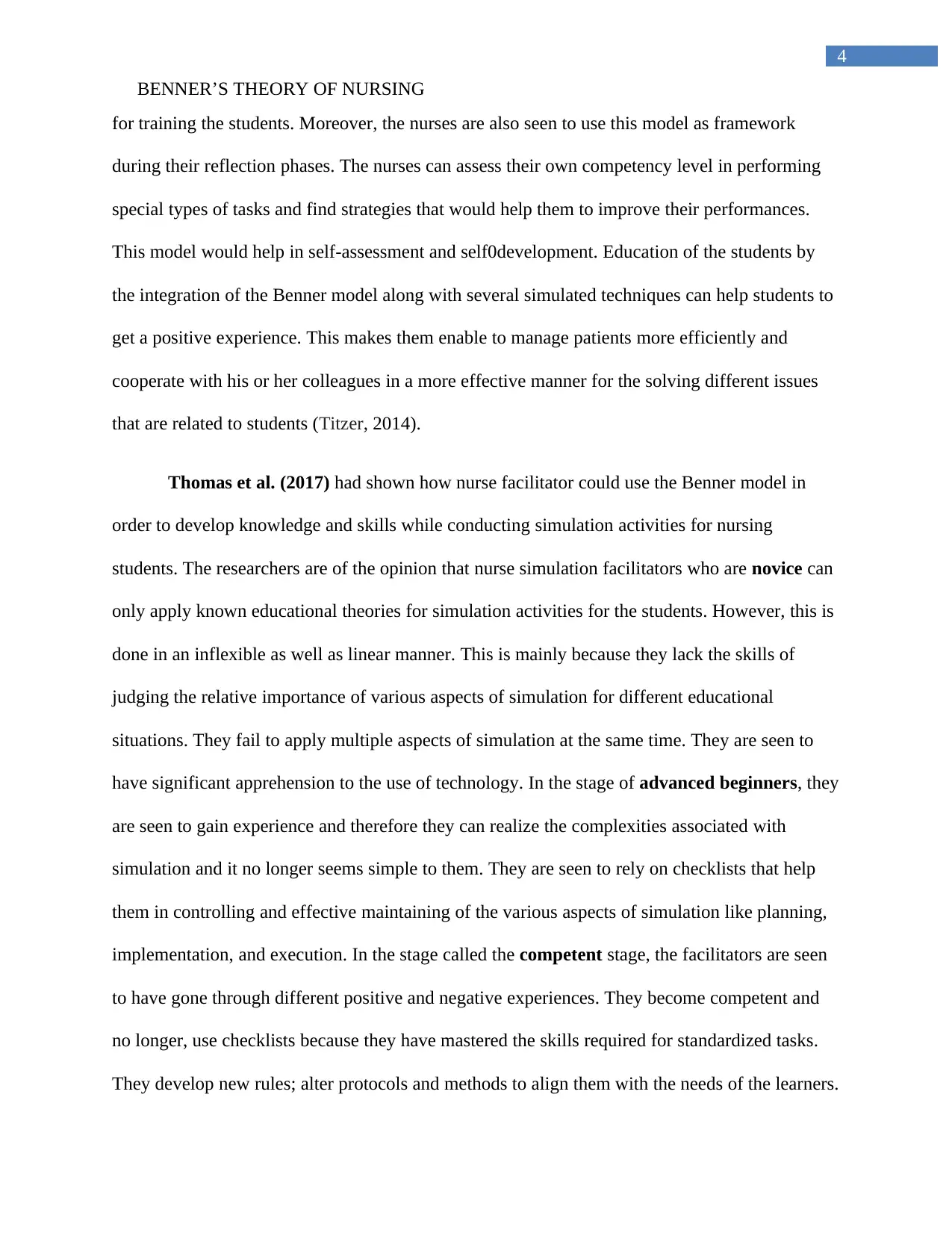
4
BENNER’S THEORY OF NURSING
for training the students. Moreover, the nurses are also seen to use this model as framework
during their reflection phases. The nurses can assess their own competency level in performing
special types of tasks and find strategies that would help them to improve their performances.
This model would help in self-assessment and self0development. Education of the students by
the integration of the Benner model along with several simulated techniques can help students to
get a positive experience. This makes them enable to manage patients more efficiently and
cooperate with his or her colleagues in a more effective manner for the solving different issues
that are related to students (Titzer, 2014).
Thomas et al. (2017) had shown how nurse facilitator could use the Benner model in
order to develop knowledge and skills while conducting simulation activities for nursing
students. The researchers are of the opinion that nurse simulation facilitators who are novice can
only apply known educational theories for simulation activities for the students. However, this is
done in an inflexible as well as linear manner. This is mainly because they lack the skills of
judging the relative importance of various aspects of simulation for different educational
situations. They fail to apply multiple aspects of simulation at the same time. They are seen to
have significant apprehension to the use of technology. In the stage of advanced beginners, they
are seen to gain experience and therefore they can realize the complexities associated with
simulation and it no longer seems simple to them. They are seen to rely on checklists that help
them in controlling and effective maintaining of the various aspects of simulation like planning,
implementation, and execution. In the stage called the competent stage, the facilitators are seen
to have gone through different positive and negative experiences. They become competent and
no longer, use checklists because they have mastered the skills required for standardized tasks.
They develop new rules; alter protocols and methods to align them with the needs of the learners.
BENNER’S THEORY OF NURSING
for training the students. Moreover, the nurses are also seen to use this model as framework
during their reflection phases. The nurses can assess their own competency level in performing
special types of tasks and find strategies that would help them to improve their performances.
This model would help in self-assessment and self0development. Education of the students by
the integration of the Benner model along with several simulated techniques can help students to
get a positive experience. This makes them enable to manage patients more efficiently and
cooperate with his or her colleagues in a more effective manner for the solving different issues
that are related to students (Titzer, 2014).
Thomas et al. (2017) had shown how nurse facilitator could use the Benner model in
order to develop knowledge and skills while conducting simulation activities for nursing
students. The researchers are of the opinion that nurse simulation facilitators who are novice can
only apply known educational theories for simulation activities for the students. However, this is
done in an inflexible as well as linear manner. This is mainly because they lack the skills of
judging the relative importance of various aspects of simulation for different educational
situations. They fail to apply multiple aspects of simulation at the same time. They are seen to
have significant apprehension to the use of technology. In the stage of advanced beginners, they
are seen to gain experience and therefore they can realize the complexities associated with
simulation and it no longer seems simple to them. They are seen to rely on checklists that help
them in controlling and effective maintaining of the various aspects of simulation like planning,
implementation, and execution. In the stage called the competent stage, the facilitators are seen
to have gone through different positive and negative experiences. They become competent and
no longer, use checklists because they have mastered the skills required for standardized tasks.
They develop new rules; alter protocols and methods to align them with the needs of the learners.
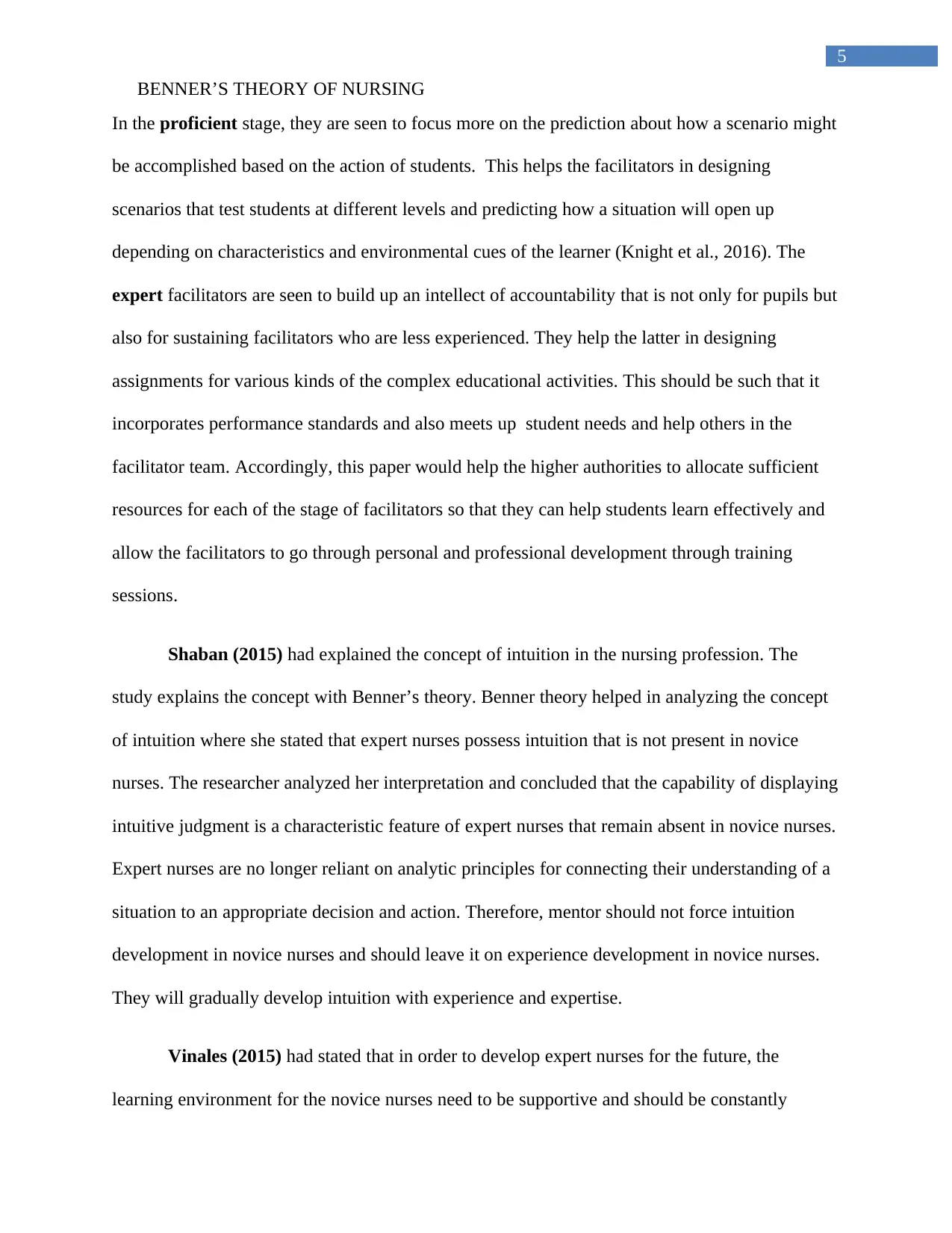
5
BENNER’S THEORY OF NURSING
In the proficient stage, they are seen to focus more on the prediction about how a scenario might
be accomplished based on the action of students. This helps the facilitators in designing
scenarios that test students at different levels and predicting how a situation will open up
depending on characteristics and environmental cues of the learner (Knight et al., 2016). The
expert facilitators are seen to build up an intellect of accountability that is not only for pupils but
also for sustaining facilitators who are less experienced. They help the latter in designing
assignments for various kinds of the complex educational activities. This should be such that it
incorporates performance standards and also meets up student needs and help others in the
facilitator team. Accordingly, this paper would help the higher authorities to allocate sufficient
resources for each of the stage of facilitators so that they can help students learn effectively and
allow the facilitators to go through personal and professional development through training
sessions.
Shaban (2015) had explained the concept of intuition in the nursing profession. The
study explains the concept with Benner’s theory. Benner theory helped in analyzing the concept
of intuition where she stated that expert nurses possess intuition that is not present in novice
nurses. The researcher analyzed her interpretation and concluded that the capability of displaying
intuitive judgment is a characteristic feature of expert nurses that remain absent in novice nurses.
Expert nurses are no longer reliant on analytic principles for connecting their understanding of a
situation to an appropriate decision and action. Therefore, mentor should not force intuition
development in novice nurses and should leave it on experience development in novice nurses.
They will gradually develop intuition with experience and expertise.
Vinales (2015) had stated that in order to develop expert nurses for the future, the
learning environment for the novice nurses need to be supportive and should be constantly
BENNER’S THEORY OF NURSING
In the proficient stage, they are seen to focus more on the prediction about how a scenario might
be accomplished based on the action of students. This helps the facilitators in designing
scenarios that test students at different levels and predicting how a situation will open up
depending on characteristics and environmental cues of the learner (Knight et al., 2016). The
expert facilitators are seen to build up an intellect of accountability that is not only for pupils but
also for sustaining facilitators who are less experienced. They help the latter in designing
assignments for various kinds of the complex educational activities. This should be such that it
incorporates performance standards and also meets up student needs and help others in the
facilitator team. Accordingly, this paper would help the higher authorities to allocate sufficient
resources for each of the stage of facilitators so that they can help students learn effectively and
allow the facilitators to go through personal and professional development through training
sessions.
Shaban (2015) had explained the concept of intuition in the nursing profession. The
study explains the concept with Benner’s theory. Benner theory helped in analyzing the concept
of intuition where she stated that expert nurses possess intuition that is not present in novice
nurses. The researcher analyzed her interpretation and concluded that the capability of displaying
intuitive judgment is a characteristic feature of expert nurses that remain absent in novice nurses.
Expert nurses are no longer reliant on analytic principles for connecting their understanding of a
situation to an appropriate decision and action. Therefore, mentor should not force intuition
development in novice nurses and should leave it on experience development in novice nurses.
They will gradually develop intuition with experience and expertise.
Vinales (2015) had stated that in order to develop expert nurses for the future, the
learning environment for the novice nurses need to be supportive and should be constantly
⊘ This is a preview!⊘
Do you want full access?
Subscribe today to unlock all pages.

Trusted by 1+ million students worldwide
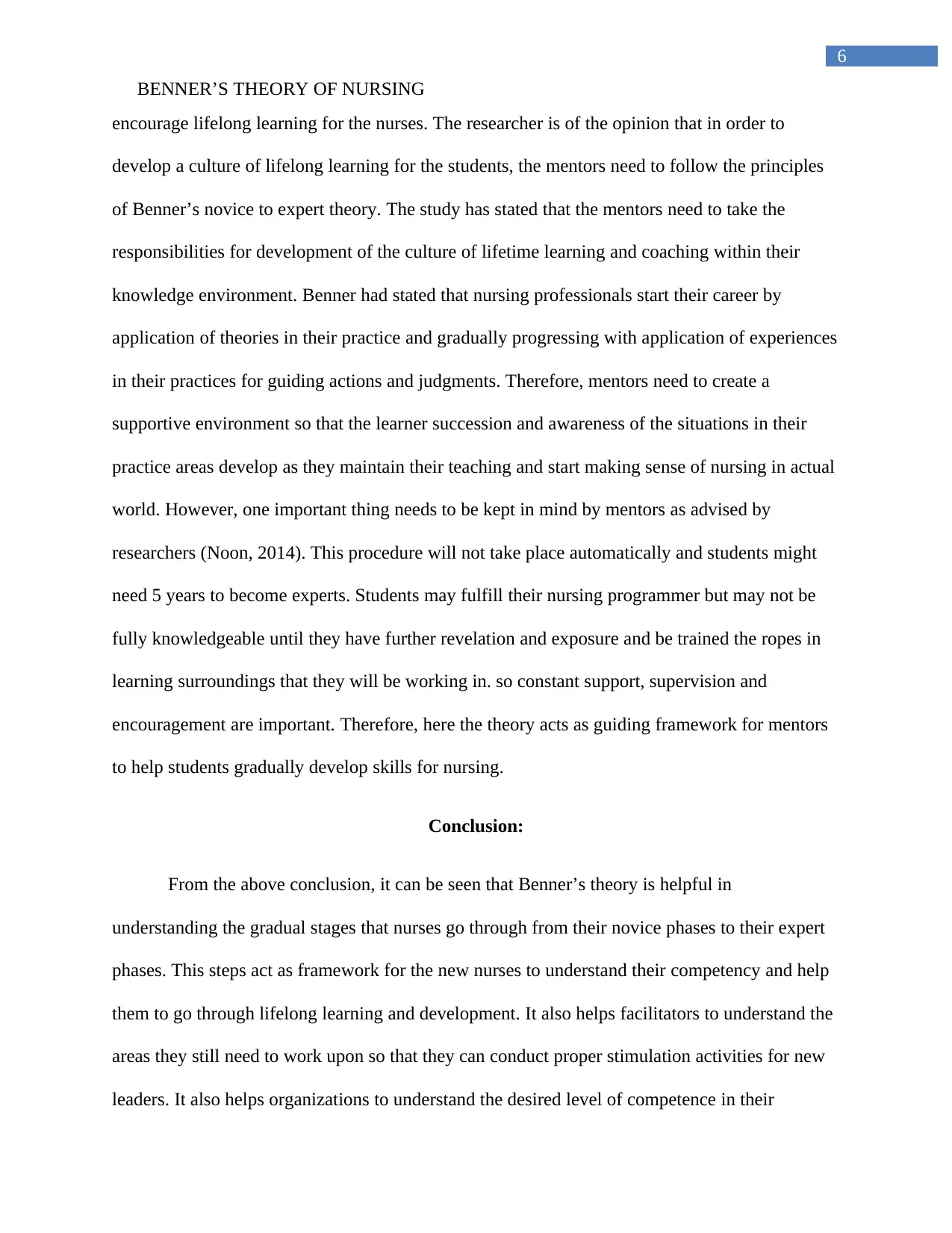
6
BENNER’S THEORY OF NURSING
encourage lifelong learning for the nurses. The researcher is of the opinion that in order to
develop a culture of lifelong learning for the students, the mentors need to follow the principles
of Benner’s novice to expert theory. The study has stated that the mentors need to take the
responsibilities for development of the culture of lifetime learning and coaching within their
knowledge environment. Benner had stated that nursing professionals start their career by
application of theories in their practice and gradually progressing with application of experiences
in their practices for guiding actions and judgments. Therefore, mentors need to create a
supportive environment so that the learner succession and awareness of the situations in their
practice areas develop as they maintain their teaching and start making sense of nursing in actual
world. However, one important thing needs to be kept in mind by mentors as advised by
researchers (Noon, 2014). This procedure will not take place automatically and students might
need 5 years to become experts. Students may fulfill their nursing programmer but may not be
fully knowledgeable until they have further revelation and exposure and be trained the ropes in
learning surroundings that they will be working in. so constant support, supervision and
encouragement are important. Therefore, here the theory acts as guiding framework for mentors
to help students gradually develop skills for nursing.
Conclusion:
From the above conclusion, it can be seen that Benner’s theory is helpful in
understanding the gradual stages that nurses go through from their novice phases to their expert
phases. This steps act as framework for the new nurses to understand their competency and help
them to go through lifelong learning and development. It also helps facilitators to understand the
areas they still need to work upon so that they can conduct proper stimulation activities for new
leaders. It also helps organizations to understand the desired level of competence in their
BENNER’S THEORY OF NURSING
encourage lifelong learning for the nurses. The researcher is of the opinion that in order to
develop a culture of lifelong learning for the students, the mentors need to follow the principles
of Benner’s novice to expert theory. The study has stated that the mentors need to take the
responsibilities for development of the culture of lifetime learning and coaching within their
knowledge environment. Benner had stated that nursing professionals start their career by
application of theories in their practice and gradually progressing with application of experiences
in their practices for guiding actions and judgments. Therefore, mentors need to create a
supportive environment so that the learner succession and awareness of the situations in their
practice areas develop as they maintain their teaching and start making sense of nursing in actual
world. However, one important thing needs to be kept in mind by mentors as advised by
researchers (Noon, 2014). This procedure will not take place automatically and students might
need 5 years to become experts. Students may fulfill their nursing programmer but may not be
fully knowledgeable until they have further revelation and exposure and be trained the ropes in
learning surroundings that they will be working in. so constant support, supervision and
encouragement are important. Therefore, here the theory acts as guiding framework for mentors
to help students gradually develop skills for nursing.
Conclusion:
From the above conclusion, it can be seen that Benner’s theory is helpful in
understanding the gradual stages that nurses go through from their novice phases to their expert
phases. This steps act as framework for the new nurses to understand their competency and help
them to go through lifelong learning and development. It also helps facilitators to understand the
areas they still need to work upon so that they can conduct proper stimulation activities for new
leaders. It also helps organizations to understand the desired level of competence in their
Paraphrase This Document
Need a fresh take? Get an instant paraphrase of this document with our AI Paraphraser
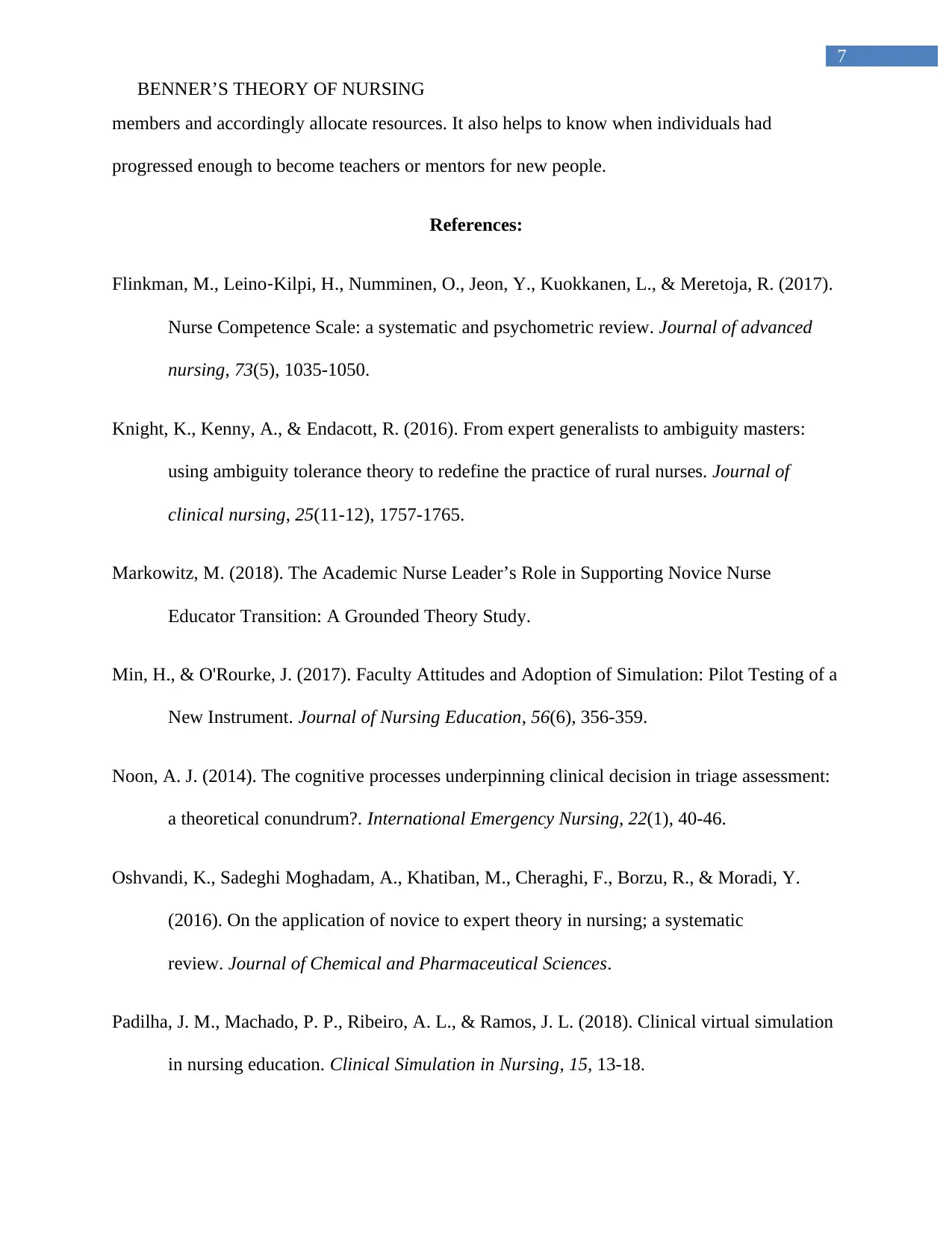
7
BENNER’S THEORY OF NURSING
members and accordingly allocate resources. It also helps to know when individuals had
progressed enough to become teachers or mentors for new people.
References:
Flinkman, M., Leino‐Kilpi, H., Numminen, O., Jeon, Y., Kuokkanen, L., & Meretoja, R. (2017).
Nurse Competence Scale: a systematic and psychometric review. Journal of advanced
nursing, 73(5), 1035-1050.
Knight, K., Kenny, A., & Endacott, R. (2016). From expert generalists to ambiguity masters:
using ambiguity tolerance theory to redefine the practice of rural nurses. Journal of
clinical nursing, 25(11-12), 1757-1765.
Markowitz, M. (2018). The Academic Nurse Leader’s Role in Supporting Novice Nurse
Educator Transition: A Grounded Theory Study.
Min, H., & O'Rourke, J. (2017). Faculty Attitudes and Adoption of Simulation: Pilot Testing of a
New Instrument. Journal of Nursing Education, 56(6), 356-359.
Noon, A. J. (2014). The cognitive processes underpinning clinical decision in triage assessment:
a theoretical conundrum?. International Emergency Nursing, 22(1), 40-46.
Oshvandi, K., Sadeghi Moghadam, A., Khatiban, M., Cheraghi, F., Borzu, R., & Moradi, Y.
(2016). On the application of novice to expert theory in nursing; a systematic
review. Journal of Chemical and Pharmaceutical Sciences.
Padilha, J. M., Machado, P. P., Ribeiro, A. L., & Ramos, J. L. (2018). Clinical virtual simulation
in nursing education. Clinical Simulation in Nursing, 15, 13-18.
BENNER’S THEORY OF NURSING
members and accordingly allocate resources. It also helps to know when individuals had
progressed enough to become teachers or mentors for new people.
References:
Flinkman, M., Leino‐Kilpi, H., Numminen, O., Jeon, Y., Kuokkanen, L., & Meretoja, R. (2017).
Nurse Competence Scale: a systematic and psychometric review. Journal of advanced
nursing, 73(5), 1035-1050.
Knight, K., Kenny, A., & Endacott, R. (2016). From expert generalists to ambiguity masters:
using ambiguity tolerance theory to redefine the practice of rural nurses. Journal of
clinical nursing, 25(11-12), 1757-1765.
Markowitz, M. (2018). The Academic Nurse Leader’s Role in Supporting Novice Nurse
Educator Transition: A Grounded Theory Study.
Min, H., & O'Rourke, J. (2017). Faculty Attitudes and Adoption of Simulation: Pilot Testing of a
New Instrument. Journal of Nursing Education, 56(6), 356-359.
Noon, A. J. (2014). The cognitive processes underpinning clinical decision in triage assessment:
a theoretical conundrum?. International Emergency Nursing, 22(1), 40-46.
Oshvandi, K., Sadeghi Moghadam, A., Khatiban, M., Cheraghi, F., Borzu, R., & Moradi, Y.
(2016). On the application of novice to expert theory in nursing; a systematic
review. Journal of Chemical and Pharmaceutical Sciences.
Padilha, J. M., Machado, P. P., Ribeiro, A. L., & Ramos, J. L. (2018). Clinical virtual simulation
in nursing education. Clinical Simulation in Nursing, 15, 13-18.
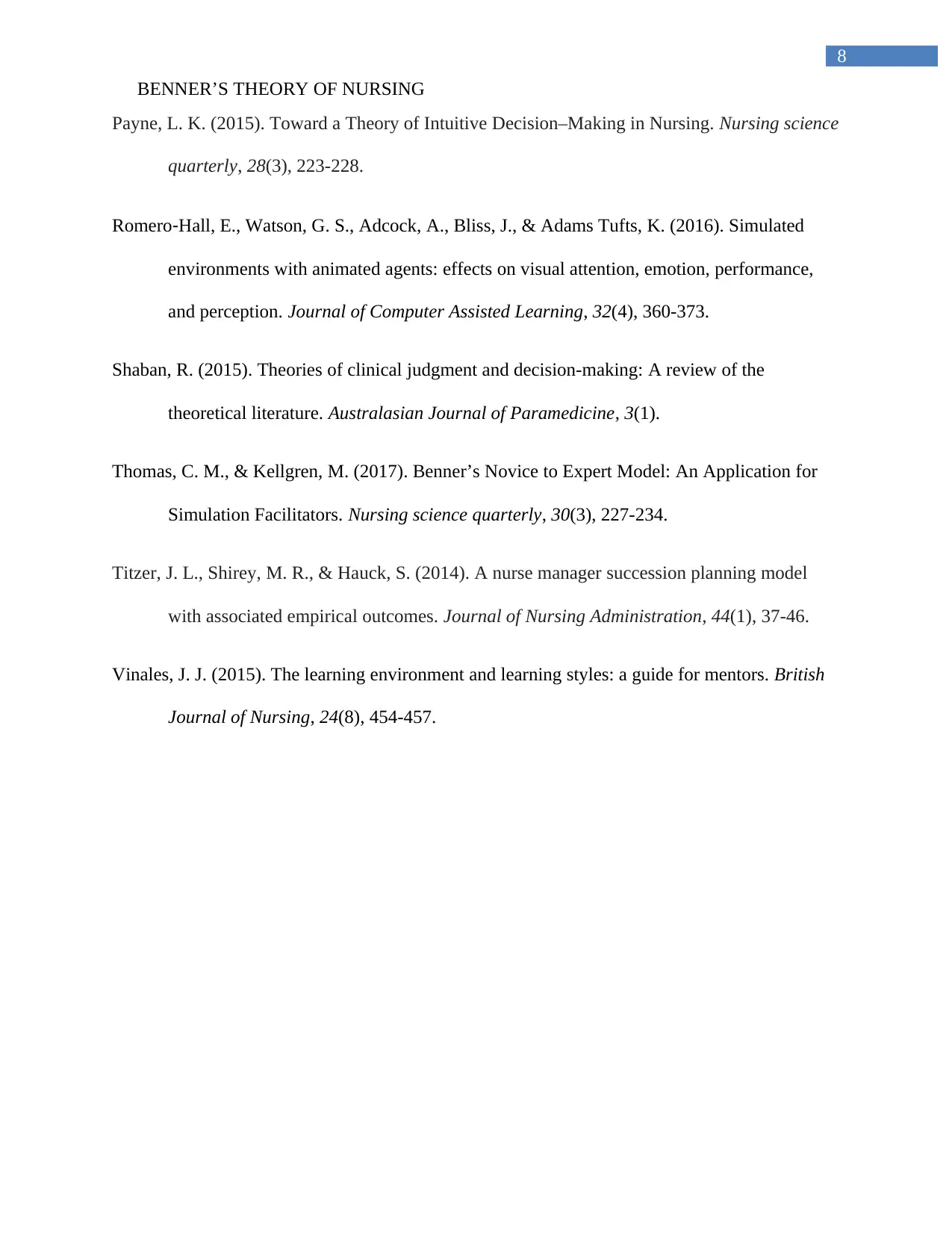
8
BENNER’S THEORY OF NURSING
Payne, L. K. (2015). Toward a Theory of Intuitive Decision–Making in Nursing. Nursing science
quarterly, 28(3), 223-228.
Romero‐Hall, E., Watson, G. S., Adcock, A., Bliss, J., & Adams Tufts, K. (2016). Simulated
environments with animated agents: effects on visual attention, emotion, performance,
and perception. Journal of Computer Assisted Learning, 32(4), 360-373.
Shaban, R. (2015). Theories of clinical judgment and decision-making: A review of the
theoretical literature. Australasian Journal of Paramedicine, 3(1).
Thomas, C. M., & Kellgren, M. (2017). Benner’s Novice to Expert Model: An Application for
Simulation Facilitators. Nursing science quarterly, 30(3), 227-234.
Titzer, J. L., Shirey, M. R., & Hauck, S. (2014). A nurse manager succession planning model
with associated empirical outcomes. Journal of Nursing Administration, 44(1), 37-46.
Vinales, J. J. (2015). The learning environment and learning styles: a guide for mentors. British
Journal of Nursing, 24(8), 454-457.
BENNER’S THEORY OF NURSING
Payne, L. K. (2015). Toward a Theory of Intuitive Decision–Making in Nursing. Nursing science
quarterly, 28(3), 223-228.
Romero‐Hall, E., Watson, G. S., Adcock, A., Bliss, J., & Adams Tufts, K. (2016). Simulated
environments with animated agents: effects on visual attention, emotion, performance,
and perception. Journal of Computer Assisted Learning, 32(4), 360-373.
Shaban, R. (2015). Theories of clinical judgment and decision-making: A review of the
theoretical literature. Australasian Journal of Paramedicine, 3(1).
Thomas, C. M., & Kellgren, M. (2017). Benner’s Novice to Expert Model: An Application for
Simulation Facilitators. Nursing science quarterly, 30(3), 227-234.
Titzer, J. L., Shirey, M. R., & Hauck, S. (2014). A nurse manager succession planning model
with associated empirical outcomes. Journal of Nursing Administration, 44(1), 37-46.
Vinales, J. J. (2015). The learning environment and learning styles: a guide for mentors. British
Journal of Nursing, 24(8), 454-457.
⊘ This is a preview!⊘
Do you want full access?
Subscribe today to unlock all pages.

Trusted by 1+ million students worldwide
1 out of 9
Related Documents
Your All-in-One AI-Powered Toolkit for Academic Success.
+13062052269
info@desklib.com
Available 24*7 on WhatsApp / Email
![[object Object]](/_next/static/media/star-bottom.7253800d.svg)
Unlock your academic potential
Copyright © 2020–2025 A2Z Services. All Rights Reserved. Developed and managed by ZUCOL.





